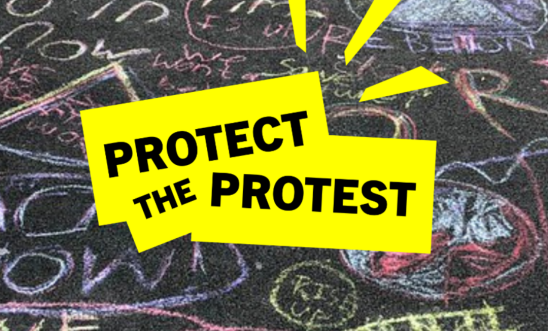
The Policing of Cop26 and the Right to Protest in Scotland

In the lead up to CoP26 in Glasgow last November Police Scotland chiefs committed to taking a ‘human rights based approach’ to policing protest, however it didn't take long for concerning reports of police containing protestors using the tactic of ‘kettlingʼ, using excessive force, cracking down on peaceful direct action, and abusing stop and search powers to emerge.
Several civil society organisations and campaigners took steps to detail and compile tactics used by Police against protestors for the purposes of accountability and learning.
Amnesty has consistently raised concerns about the gap between Police Scotland's warm words, and evidence of a human rights based aproach to policing generally, and warned that real accountability is missing. Protecting the rights associated with peaceful protest and taking a truly human rights-based approach needs robust monitoring with a legal underpinning. Such processes have never been embedded in the centralised force – meaning that data on key policing activities like use of force is unavailable. This makes measurement of discriminatory policing impossible.
As a member of the Indepedent Advisory Group set up to advise on policing of Cop26, Amnesty prepared the following briefing for the group. Our submission makes a number of recommendations, including that investigations into all reports of use of excessive force, intimidation of protestors, misues of stop and search procedures, use of kettling, and all arrests, must take place.
We conclude that there remains work to be done to ensure the right to peaceful protest is routinely facilitated and upheld in Scotland. The force shold consider adopting and embedding the NETPOL Charter for Freedom of Assembly which operationalises General Comment 37 from the Human Rights Council. A renewed effort to increase accountability and transparency will also be necessary. For example, the pro-active publication of disaggregated data around policing activties, and particularly use of force, will allow civil society and the public to measure claims made against evidence and data.
The unacceptable crackdown on the right to protest in England and Wales through the introduction of draconian legislation, has thankfully changed little in Scotland, however we must still push for the rull realisation of rights here, and guard against regression.
If you would like to learn more about your right to protest Amnesty Scotland has recently produced a legal guide with JRS Knowhow that can be found here: https://jrsknowhow.org/your-right-to-protest/
The Scottish Community Activist Legal Project (SCALP) also have an excellent guide and provide some training and further support: https://www.scottishactivistlegalproject.co.uk/
Full list of Amnesty recommendations:
1. Police Scotland’s Independent Advisory Groups should have clear mechanisms for referring issues to the appropriate scrutiny body to investigate and report publicly. Advisory Groups are not and must not be seen as a substitute for robust statutory regulation and scrutiny of the police. Their role must be explicit and defined with all investigations of the police carried out by scrutiny bodies with the requisite legal powers.
2. That Police Scotland adopt the NETPOL Charter for Freedom of Assembly which operationalises General Comment 37 from the Human Rights Council.
3. That there are investigations into all reports of excessive force, intimidation of protesters, misuse or inappropriate Stop and Search procedure, use of kettling/containment and a review of arrests connected to COP26. A full evaluation with lessons learned will demonstrate what went well as well as where there can be improvements.
4. All current restrictions on the provision of information should be removed and a full human rights analysis should be made of the use of kettling/containment by an independent expert.
5. Police Scotland should review its approach to communicating with protestors, including communications prior to COP26 as well as during, both directly with organisers and protest group representatives but also media output and public comments.
6. The Independent Advisory group on Emerging Police Technology will be reporting on the process and procedures regarding surveillance equipment, and Amnesty will continue to oppose any attempt to introduce the use of facial recognition technology by the police in Scotland. We hope that new systems for emerging tech will include strong human rights safeguards and that Police Scotland will commit to further transparency and accountability for equipment that risks human rights breaches
- Downloads
- Policing of Cop26.pdf
Our blogs are written by Amnesty International staff, volunteers and other interested individuals, to encourage debate around human rights issues. They do not necessarily represent the views of Amnesty International.
0 comments